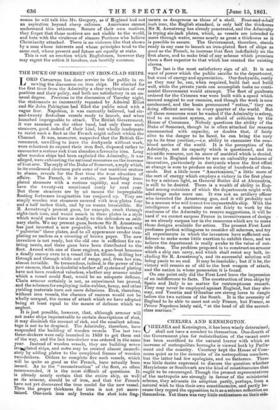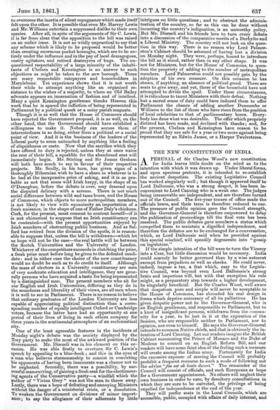CHELSEA AND KENSINGTON.
CHELSEA and Kensington, it has been wisely determined, shall not have a member to themselves. One-fourth of the Government plan for redistribution of the vacant seats has been sacrificed to the natural horror with which an increase of metropolitan boroughs is viewed both by Parlia- ment and the country. Courtesy kept the House of Com- mons quiet as to the demerits of its metropolitan members, but the latter had lbw apologists, and no flatterers. There was little desire expressed to discuss the question whether Marylebone or Southwark are the kind of constituencies that ought to be encouraged. Though the present representatives of the metropolis are strongly in favour of the ministerial scheme, they advocate its adoption partly, perhaps, from a natural wish to thin their own constituencies, and partly be- cause they regard the opposition to it as a solemn reflection on themselves. Yet there was very little enthusiasm on their side CHELSEA and Kensington, it has been wisely determined, shall not have a member to themselves. One-fourth of the Government plan for redistribution of the vacant seats has been sacrificed to the natural horror with which an increase of metropolitan boroughs is viewed both by Parlia- ment and the country. Courtesy kept the House of Com- mons quiet as to the demerits of its metropolitan members, but the latter had lbw apologists, and no flatterers. There was little desire expressed to discuss the question whether Marylebone or Southwark are the kind of constituencies that ought to be encouraged. Though the present representatives of the metropolis are strongly in favour of the ministerial scheme, they advocate its adoption partly, perhaps, from a natural wish to thin their own constituencies, and partly be- cause they regard the opposition to it as a solemn reflection on themselves. Yet there was very little enthusiasm on their side to overcome the inertia of silent repugnance which made itself felt upon the other. It is possible that even Mr. Harvey Lewis and Mr. Williams entertain a suppressed dislike to their own species. After all, in spite of the arguments of Sir C. Lewis, it is far from clear that the opposition to the bill was raised on an unfair issue. It is not so wildly unpractical to say that any scheme which is likely to be proposed would be better than creating enormous pocket boroughs, which are to be en- tirely under the influence and in the pay of local demagogues, vestry agitators, and retired destroyers of bugs. The un- questioned respectability of a large minority of the inhabi- tants of Chelsea and Kensington is no answer to such objections as might be taken to the new borough. There are many respectable ratepayers and householders in Marylebone. Yet experience shows that it is not worth their while to attempt anything like an organized re- sistance to the wishes of a majority, to whom an Old Bailey advocate appears an incarnation of fashion and of intellect. Many a quiet Kensington gentleman thanks Heaven this week that he is spared the infliction of being represented in Parliament by a political quack or a noisy parish magnate. Though it is as well that the House of Commons should have rejected the Government proposal, it is as well, on the other hand, that the Government should have exhibited a willingness to make it. Nobody can accuse them of interestedness in so doing, either from a political or a social point of view. And it is the business of the leaders of the Liberal party to seem untouched by anything like a feeling of cliquishness or caste. Now that the sacrifice which they have offered to duty is rejected, unless they at once waive the rest of their bill, a squabble for the abandoned seat will immediately begin. Mr. Stirling and Sir James Graham will both have much to say in favour of their respective projects. Mr. Scully, in his turn, has given signs of a thoroughly Hibernian wish to have a share in whatever is to be had at the inexpensive price of asking, and it is as pro- bable as not that some wild Irish harpy, in the shape of an O'Donoghue, before the debate is over, may descend upon the disputed delicacy with a scream. There is not much social difference between wild and tame bores, and the House of Commons, which objects to more metropolitan members, is not likely to view with equanimity an importation of a fresh nuisance, in the shape of one of Father Daly's chickens. Cork, for the present, must consent to content herself—if it is not chimerical to suppose that an Irish constituency can be contented—with the present opportunities enjoyed by Irish members of obstructing public business. And as Sal- ford has retired from the division of the spoils, it is reason- able to suppose that, unless the bill is withdrawn—which let us hope will not be the case—the real battle will be between the Scotch Universities and the University of London. Whichever of the competitors succeeds in clutching the prize, a fresh prize must before long be given to the defeated candi- date : and in either case the choice of the new constituency would no doubt be such as to do credit to itself. Although the mass of electors in a University constituency are men of very moderate education and intelligence, they are gene- rally persons who have acquired a taste for being represented by a distinguished man. The present members who sit for our English and Irish Universities, differing as they do in the soundness and liberality of their views, are all men whom it is well to see in Parliament. There is no reason to believe that ordinary graduates of the London University are less capable of appreciating political distinction than a corre- sponding number of equally intelligent Oxford or Cambridge voters, because the latter have had an opportunity at one period of their lives of living in each others company for three years in the sentimental atmosphere of an ecclesiastical city. One of the least agreeable features in the incidents of Monday night's debate was the anxiety displayed by the Tory party to make the moat of the awkward position of the Government. Mr. Disraeli was in his element on this oc- casion. He was able firstly to overturn Sir C. Lewis's speech by appealing to a blue-book ; and this in the eyes of a man who believes statesmanship to consist in convicting his opponents of having been inaccurate was a chance not to be neglected. Secondly, there was a possibility, by suc- cessful manwuvring, of gaining a fresh seat for the electioneer- ing agents of the Conservative party—a windfall which the author of " Vivian Grey " was not the man to throw away. Lastly, there was a hope of defeating and annoying Ministers without the danger of a ministerial crisis, or a dissolution. To weaken the Government on divisions of minor import- ance ; to sap the allegiance of their adherents by little intrigues on little questions ; and to obstruct the adminis- tration of the country, so far as this can be done without incurring the country's indignation, is an unworthy policy. But Mr. Disraeli and his friends love to turn every debate into a discussion of the comparative merits of a Derbyite and a Liberal Ministry. The country will not look on the ques- tion in this way. There is no reason why Lord Palmer- ston'a Cabinet should be ashamed of having lost a division on Monday night. They were, perhaps, bound to introduce the bill as it stood, rather than in any other shape. It was not for Ministers, but for the House of Commons, to ques- tion the propriety of adding to the number of metropolitan members. Lord Palmerston could not possibly gain by the adoption of his own measure. On this occasion he has shown, if anything, an absence of political greed. There are seats to give away, and yet, those of the household have not attempted to divide the spoil. Under these circumstances, it is ridiculous to taunt Ministers with, their defeat. Nothing but a sacred sense of duty could have induced them to offer Parliament the chance of adding another Duncombe or Williams to the list of those who have risen from the position of local celebrities to that of parliamentary bores. Every- body has done what was desirable. The offer which propriety dictated has been made, and declined with thanks ; and, for the present, Chelsea and Kensington have reason to be proud that they are safe for a year or two more against being represented by an Edwin James, or a Harper Twelvetrees.































 Previous page
Previous page